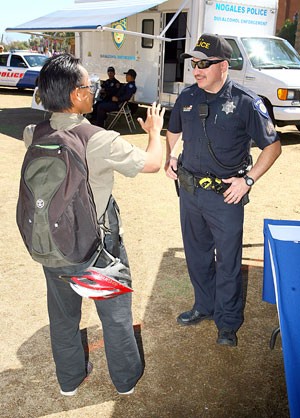Although students’ main focus may lie with having a good time on spring break, there are safety issues of which students need to be aware.
The Associated Students of the University of Arizona teamed up with the Dean of Students Office and the University of Arizona Police Department to set up the Spring Break Safety Fair yesterday on the UA Mall featuring several area organizations.
The overall theme of the fair is to inform students about the dangers they may face over spring break, ranging from drunken driving to international law, said ASUA Senator Brent Hanson, co-creator of the event.
“”With spring break on people’s minds, it’s always great to have a good time,”” he said. “”But you also have to be safe.””
Much of the fair focused on informing students about the dangers of alcohol, binge drinking and drunken driving. Among the presentations was a display of posters in which a mother narrates the story of how her son was killed by a drunken driver.
Although the specific story was fictitious, it is not unlike the stories shared by the thousands of families who have had loved ones killed by drunken drivers, Hanson said.
“”It’s a reminder of the dangers of drinking and driving by putting a face on it,”” he said. “”Hopefully students will remember this and make the right decision.””
Besides being an emotional story, the display was a reminder that drunken driving affects more than just those drinking, said Ariel Cooper, a veterinary sciences sophomore.
“”It’s sad, but it’s not surprising at all,”” she said. “”Drunk driving happens a lot more than we’d like to believe.””
Besides traffic accidents, students should also be concerned about other aspects of drinking, such as impaired judgment and trouble with the law, Cooper said.
“”You hear a lot of stories over spring break not only about drinking and driving, but also about people doing things that they later regret,”” she said.
Tyler Shira, an undeclared sophomore, agreed.
“”People need to know the consequences of their actions,”” Shira said.
To simulate a blood-alcohol level of .07 to .10, the Governor’s Office of Highway Safety invited students to shoot a mini-ball at a basketball hoop while wearing Fatal Vision Goggles.
The exercise proved to be more challenging than expected, said Kelly Moore, a marketing sophomore.
“”It was difficult,”” she said. “”I think (the exercise) showed that a lot of the time, you might not think you’re drunk, but you really are.””
The impaired ability to perform the minimal task is trivial in comparison to the difficulty of properly driving a car while intoxicated, said Terry Rutan, project coordinator for the Governor’s Office of Highway Safety.
“”We’re trying to reduce fatalities through education and enforcement,”” he said. “”If you’re going to drink, have a plan to get home besides driving yourself.””
Various law enforcement officials were also on-hand to answer students’ questions and inform spring break vacationers going to Mexico of changing laws south of the border.
Because spring break is one of the busiest times of the year for border agents, it is important for students to understand what documentation is needed to get back into the U.S. in order to make the situation easier on everyone, said Brian Levin, public affairs liaison for US Customs and Border Protection.
“”We are expecting to see a lot of people,”” he said. “”It’s all about preparation, preparation, preparation.””
When traveling to Mexico, students should also take note of the local legal system by visiting the U.S. Customs and Border Protection Web site, Levin said.
“”When you’re in a foreign country, laws are different,”” he said. “”People need to understand what can and can’t get back in.””
There are several strategies that students can adopt when traveling out of country to keep themselves and those in their groups safe. These can range from paying attention to the cleanliness of the food to implementing a buddy system with friends, said Caitlin Griffin, member of the Student Health Advisory Committee.
“”It’s all about making smart decisions and looking after yourself,”” Griffin said. “”People never think anything will happen to them, but things happen.””
Although the event is designed to inform the entire student population, it is especially crucial to first-year students who are just now experiencing the freedom of college lifestyles. The safety fair shows these students that there are legitimate concerns that arise from spring break, said ASUA Senator Amanda Collins, co-creator of the event.
“”This is huge for freshmen who are experiencing their first spring break,”” Collins said. “”We’re reaching out to them and informing students that there are resources available.””
While freshmen are enjoying their newfound freedom, they can also look out for themselves. Freshmen do not need to make a choice between the two, said Caiti Morrison, member of the ASUA Freshman Class Council.
“”You can still go out and have fun,”” Morrison said. “”But you also need to be safe and know what you’re doing.””









